Next class of physicians gathers for White Coat Ceremony
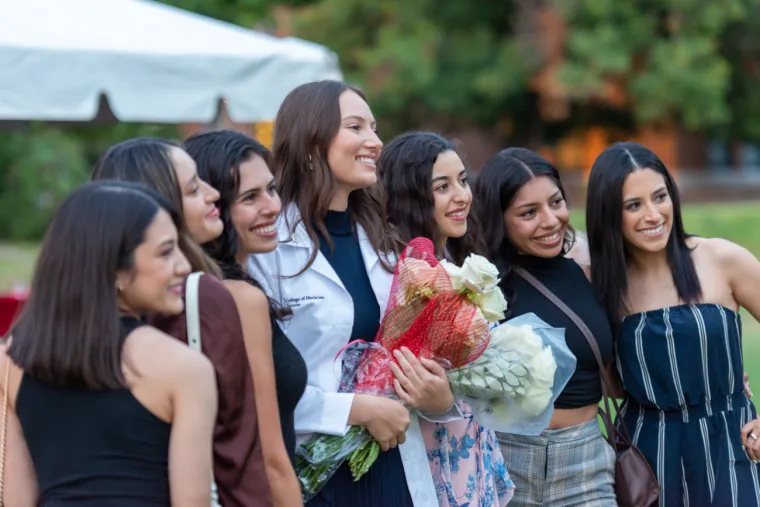

What: White Coat Ceremony for the University of Arizona College of Medicine – Tucson Class of 2027
When: Friday, July 21, 5:30-7:30 p.m. Parking, seating and other general information at medicine.arizona.edu/admissions/annual-event/white-coat-ceremony-class-2027
Where: UArizona Centennial Hall, 1020 E. University Blvd., Tucson and livestreamed on Facebook Live: www.facebook.com/UAZMedTucson/live
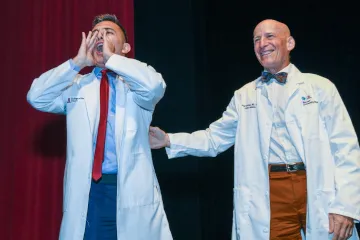
This week, 120 University of Arizona College of Medicine – Tucson students will take part in a July 21 White Coat Ceremony to welcome the Class of 2027. The ceremony will be held at Centennial Hall at 1020 E. University Blvd., from 5:30 to 7:30 p.m. The event recognizes medical students’ entry into medicine with their first physician’s white coat, the garment of their future profession.
“We are excited to welcome the Class of 2027 to the College of Medicine – Tucson with the White Coat Ceremony. This ceremony is an opportunity to welcome students into our professional community and remind them of the values they will be held accountable for as medical students and physicians,” said Kevin Moynahan, MD, the college’s vice dean for education and a professor of medicine. “The COVID-19 pandemic served as a powerful reminder of the indispensable role of medical professionals in our society. As we welcome this incoming class, we celebrate the duty of physicians to serve their communities by providing compassionate, patient-centered medical care.”
The White Coat Ceremony is considered a rite of passage in most U.S. medical schools. The first University of Arizona College of Medicine – Tucson White Coat event was held in 1995, and it has been a tradition for incoming UArizona medical students since. The Arnold P. Gold Foundation established the first white coat ceremony in 1993 at Columbia University in New York as a way to highlight the importance of humanism in all care of patients.
Guest Speaker
Speaking at the event will be Class of 2006 alum Felipe Perez, MD, FAAFP, designated institutional official, director of Medical and Health Professions Education, director of a Family Medicine Residency Program and center director of the Southern Arizona Area Health Education at El Rio Community Health Center. Dr. Perez earned his medical degree from the College of Medicine – Tucson and attended Scripps Family Medicine Residency Program in Southern California, where he served as chief resident during his last year of training. He is focused on exploring innovative graduate medical education models to help address social determinants of health in rural and underserved communities.
Class of 2027
The Class of 2027 is 62% female and 38% male, with ages ranging from 20 to 36. Of 120 students, 89 are from Arizona, 26 are from Tucson and 12% are first-generation college students.
Below are profiles of a few of the students participating:
Jeff Greenfield: ‘Looking forward to being able to make a difference’
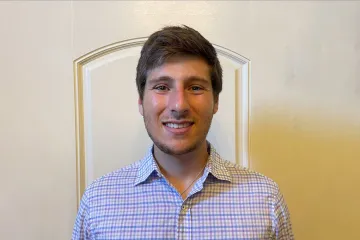
Growing up in Kansas, Jeff Greenfield had an interest in the way the body works and how drugs and chemicals can interact with it. He knew he wanted to work in science, and an elective in high school put him on the path to medical school.
“I came across a class where we helped our classmates with disabilities,” he shares. “My relationships with them were really important. I knew that whatever I wanted to do, I would incorporate the science with relationships with those people who I felt were so misunderstood.”
Those students inspired Greenfield to major in physiology and medical sciences with a minor in special education. He wanted to continue the interplay between his two interests that started in high school.
For most of his childhood, Greenfield assumed he would go to the University of Kansas — but when the time came, he decided to expand his options.
“Arizona offered a ton of scholarships,” he says. “Knowing that I wanted to go to medical school, which isn’t cheap anywhere, I figured I should at least look. I came to the campus and loved it.”
Besides loving the campus, Greenfield learned more about the physiology and medical sciences degree and the Physiology Club for undergraduate students. He was excited to start an education that was focused on the human body, rather than other typical pre-medical degrees that focus on general biology or chemistry.
“My junior year, I was in biochemistry, a cell physiology class, a systems physiology class and a physiology-based bioethics class,” he recalls. “I’m learning about essentially the same molecular concepts, but I got it on a biochemistry level, a cellular level and a systems physiology level, and from an ethics perspective. It really hit me that this is because of the Physiology Department that I get to learn so many perspectives and how to integrate them more than just regurgitating them on a test.”
In the Physiology Club, Greenfield met Kyle Cook, and the two would become roommates, classmates and friends. It was through Cook that he learned about the Honors Early Acceptance Program, which allows current University of Arizona students to apply to the College of Medicine – Tucson’s Graduate Medical Education program during their junior year — a year earlier than usual.
“I figured that applying couldn’t hurt. Either it would be great experience in the middle of a really stressful time, or I would get in and that would be great,” he says. “This is somewhere that lines up really well with what I want to do. The summer program is amazing, the people have been awesome and establishing connections with the faculty has been incredible.”
Greenfield is excited to continue his journey toward becoming a physician at the College of Medicine – Tucson, and he can’t wait to get started.
“I want to keep learning more and impact people. I’m looking forward to being able to make a difference sooner rather than later,” he says. “At the end of the day, that’s why I want to go into this.”
Mele Vaohoi Kona Hala’ufia: ‘I want to be a doctor people can count on’
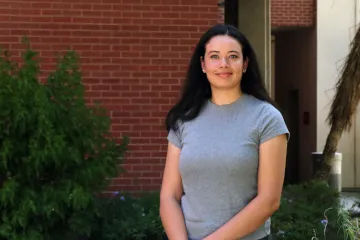
Mele Vaohoi Kona Hala’ufia grew up in Tucson and earned her undergraduate degree in physiology at the College of Medicine – Tucson. She didn’t always know she wanted to be a doctor, but her participation in high school athletics started her on a path that led to medical school.
“In high school, I played a lot of sports, so that’s what got me interested in physiology,” Hala’ufia shares. “As my courses progressed, I really enjoyed it, and I realized it was something I wanted to do for the rest of my life. That was the first time I thought I could be a doctor.”
Hala’ufia’s interest in health care continued to grow during her time in college, and she earned an EMT certification to gain firsthand clinical experience. While Hala’ufia didn’t immediately use her EMT skills, the experience proved vital after she graduated in 2021, in the midst of the COVID-19 pandemic.
“When I graduated from college, the first COVID-19 vaccines were coming out,” Hala’ufia explains. “I wanted to use my EMT certification to help in any way I could with the pandemic, so I got a job as a COVID vaccinator and spent a lot of time traveling throughout Arizona giving COVID vaccines. I felt good about it because I was helping my community through the pandemic.”
During this time, Hala’ufia discovered a passion for helping underserved communities. She joined a migrant aid organization where she administered COVID tests to immigrants entering Tucson. These experiences further solidified her desire to pursue a career in medicine and helped her find an area of focus for her studies.
“I enjoy being in contact with people from different countries and different cultures. It’s something that interests me,” Hala’ufia says. “They have distinction tracks at the College of Medicine – Tucson, and one of those is global health, so I want to get into that as a medical student.”
Hala’ufia has enjoyed her time at the College of Medicine – Tucson so far. As an undergraduate, she was involved in the physiology honors program, and particularly enjoyed the project that capped her undergraduate career.
“The honors project was my favorite part about undergrad because it was something that gave me a lot of free rein to do what I wanted, and it was something that I was really interested in,” Hala’ufia says.
The College of Medicine – Tucson was an obvious choice for Hala’ufia, considering its proximity to her family and the opportunities for service. She knows the area has a large immigrant population in need of physicians, and Hala’ufia hopes to continue serving those groups.
“I really want to be a doctor who people know they can count on,” Hala’ufia says. “I hope to be involved in the immigrant community when I’m a physician as well. That’s what I want for my career in medicine.”
Alexandra Miller: ‘I want to be at the forefront’
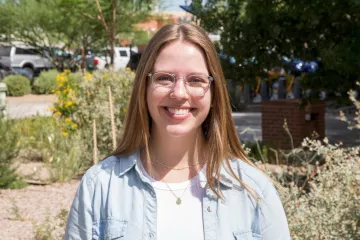
Alexandra Miller wanted to be a doctor since she was a 5-year-old helping her great-grandfather with his insulin shots. In middle school, after talking to a cousin doing postdoctoral work, she learned that research could be a career and switched her sights to science.
“I got to college and found out you can do both,” says Miller, who is entering the College of Medicine – Tucson as an MD/PhD student. “Physician-scientists are at the pinnacle of translation. You are going between bench and bedside. To have the ability to translate research back into the clinic is a huge goal of mine.”
It is her first time living outside the Midwest.
“I have a sister who was in elementary school when I went to college. It was important to me to be a part of her life,” Miller says. She chose Drake University for its ample undergraduate research opportunities.
“I started my research journey as a freshman, looking at the visual pathway in pigeons,” she says. “Then I joined a team that was looking at tourniquet care, to ease into the human side of things.”
She also had a couple of summer internships: the first with a neurology team in a local hospital and the second diving into cancer genetics at Roswell Park Comprehensive Cancer Center. After completing her bachelor’s degree, she was hired by the Mayo Clinic, where she worked in a lipid genomics lab and supervised the clinical genomics department’s research program. “My experience at Mayo cultivated that passion for genomics. Incredible innovations have happened in the last two decades. There is this revolution coming to health care, and I want to be at the forefront of it.”
Miller says that, although genomics has enormous potential to transform health care, the field is only as strong as its data — and right now, too many datasets suffer from a lack of diversity.
“A lot of data are from people with European ancestry. That’s not applicable to everyone. I knew that the University of Arizona had cool stuff happening from the genomics side of things,” she says, citing the College of Medicine – Tucson’s participation in All of Us, a National Institutes of Health initiative to create the largest, most diverse genetic datasets for precision health research.
After a lifetime in the Midwest, Miller is excited to explore the desert along with her career options as a physician.
“The great thing about genomics is that it’s applicable to every body system, so I will be able to apply that knowledge to whatever type of doctor I end up being,” she says.
Before moving to Tucson to start this new chapter, Miller stayed with her parents in Minnesota for 10 days — enough time to attend a very special event.
“My sister just graduated from high school. I got to watch her walk across the stage,” she says. Both sisters are celebrating each other’s success: “She’s coming to White Coat.”
Brianna Itzel Valencia: ‘A small ripple will become a big wave’
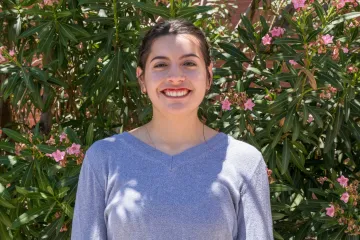
Brianna Itzel Valencia grew up in San Luis, a border town outside Yuma where she and her two siblings were raised by a single mother.
“My mom was my first role model — her work ethic, her strength. Seeing her sacrifices fueled me,” Valencia says. “At a young age, I was like, ‘What can I do to help my mom?’ I assumed those responsibilities, that caretaker role.”
A television reality series called “Trauma: Life in the ER” showed her how science could be combined with her love for helping people. In middle school, she earned a scholarship to a prestigious summer program and spent three weeks in New England learning about anatomy and physiology.
“Knowing the intricacies of the human body, like a mechanic with a car, I was like, ‘Wow, I could see myself doing this.’ I got hooked,” she says.
As a neuroscience and cognitive science major at the University of Arizona, she continued work toward a medical career, but despite scholarships and grants, she still needed a job.
“I was working 30 or 40 hours a week,” she says. “I thought this was normal, but it leads to some sort of sacrifice. In those first two years, it was my grades.”
She got a job as a scribe at Tucson Medical Center, learning more about her future profession while also earning a paycheck.
“I was walking down the halls, thinking, ‘Wow, I’m actually here. I can really see myself doing this,’” she recalls. For more than three years, emergency medicine physicians provided mentorship and encouragement. “It felt really cool to know that I was trusted as a future colleague.”
Valencia also volunteered as an interpreter at Clinica Amistad, which provides free care to uninsured and low-income patients.
“That population reminded me of my family, my home,” she says. “I can hear my voice in their voice, and their thoughts within that. I would ask them follow-up questions, and that would reveal something that would be necessary for the diagnosis.”
Her goal to be a physician locked in, Valencia enrolled in P-MAP, an intensive medical school preparation program for promising students who have faced considerable obstacles.
“I wanted to be at the top of my game, to make sure I had the strategies down to study,” she says. But she drew even greater strength from the sense of community she built with other students. “It solidified that I do belong on campus, that I deserved to be there.”
A family tradition may be in the making. Valencia’s younger sister was recently accepted to the College of Medicine – Phoenix’s Pathway Scholars Program, which is similar to P-MAP. She says they dream of returning to San Luis to offer primary and preventive health care to migrant and undocumented workers as well as the greater community.
“I want to make an impact, even if it’s something small. I don’t think you need to make big waves, because even a small ripple will become a big wave eventually,” she says. “I’m always going to think of myself as a kid from San Luis who had a dream, and now she’s here.”

